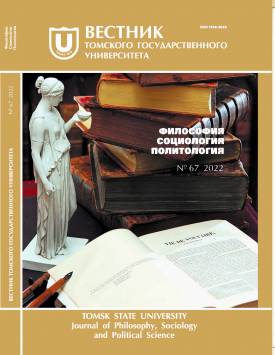“Taking care of oneself” as an experience of the marginal: Michel Foucault and Leo Tolstoy
The aim of the article is to consider the way of creating subjectivity through transition, transgression, overcoming as a part of the intellectual biography of Foucault and Tolstoy, which will make it possible to designate their common understanding of the “genuine” as necessarily opposed to the systemic, universal. Foucault’s interpretation of the concept epimeleia heautou is criticized for subjectivist interpretation, aestheticization. As a counterargument, an expanded interpretation of the meaning of these practices as hermeneutic procedures for gaining access to truth and self-knowledge is given. The ethics developed by Foucault is based not on accumulation, but, on the contrary, on cleansing from excess, intemperance, from outwardly “normal”, comfortable, and therefore not free. Selfdenial, desubjectivization, the experience of the marginal, the borderline are a necessary condition for “constituting oneself’ or “taking care of oneself’. As a result, subjectivation is a transition from non-subjectivity to subjectivity, constituting oneself as a moral subject through ethical problematization of one’s sexual behavior and building it with the help of special techniques of “stylizing” life. In Tolstoy’s case, the question of creating subjectivity through belittling it requires us to dwell on the theme of wandering in the writer’s mind. Spiritual rebirth, according to Tolstoy, is impossible without gaining independence from the external world, which means that it requires a person to realize their indifference to the world and the world to them, to dissolve in this impersonal world, and to lose their individuality. Only in this belittling is it possible to comprehend participation in everything in the world, its responsibility for everything that happens in the world, the experience of universal imperfection and sinfulness. Thus, self-denial and belittling of the personality appear not as a spiritual feat, but as a necessary condition for liberation from compulsion, from external causal dependence, that is, the finite, on the path to the divine, the infinite. The Stoic doctrine represents the condition of a dignified life for the liberation of the individual from various forms of power. The ways to get rid of this power were different: Foucault chose the path of self-creation, constituting “I” and knowing his capabilities as an author through his research activities and eccentric life forms; Tolstoy chose the path of forgetting himself as an author, leaving in order to get lost in the world, gaining the integrity of the personality through belittling its social status. Despite the difference in the chosen path, the desired goal for both seems common. The author declares no conflicts of interests.
Keywords
“taking care of oneself’, Michel Foucault, Leo Tolstoy, asceticism, wandering, transgressionAuthors
| Name | Organization | |
| Kulikov Mikhail V. | Kuzbass Institute of the Federal Penitentiary Service of Russia | philosophy_mk@mail.ru |
References

“Taking care of oneself” as an experience of the marginal: Michel Foucault and Leo Tolstoy | Tomsk State University Journal of Philosophy, Sociology and Political Science. 2022. № 67. DOI: 10.17223/1998863X/67/4
